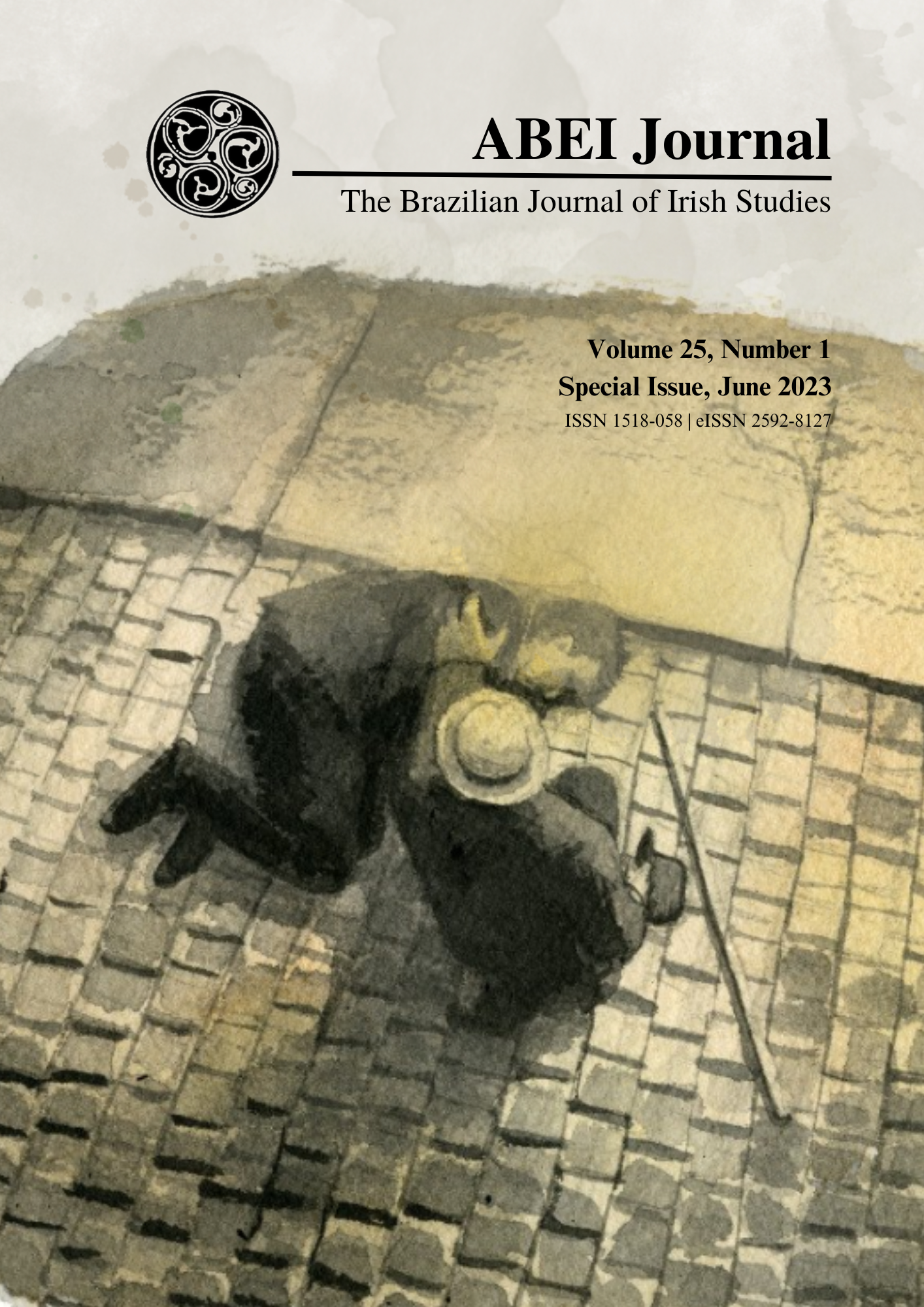“Telemaquisando” a Pobre Velha: Cathleen ni Houlihan “reencenada” em Martello Tower
DOI:
https://doi.org/10.11606/issn.2595-8127.v25i1p13-27Palavras-chave:
Telêmaco, Joyce, Yeats, Cathleen ni Houlihan, ParódiaResumo
Em 1904, Joyce publicou “The Holy Office”, em que atacava os membros do Abbey Theatre. Para o jovem Joyce, parecia que “aquela companhia de saltimbancos”, administrada por Yeats e Lady Gregory, tinha “se rendido à vontade do populacho”. Seu desejo era mostrar que tinha se libertado daquilo que considerava ser a identidade pseudo-irlandesa, popularesca, das “franjas celtas bordadas a ouro” e daqueles que em sua “tolice . . . suspiram de saudade dos velhos tempos” (Occasional, Critical and Political Writings 28) — tempos que, para ele, ficavam perfeitamente representados em Cathleen ni Houlihan. Apesar de nos informar que “Cathleen . . . foi recebida por uma verdadeira ovação”, Stanislaus Joyce deixa bem claro que seu irmão “achou ridículo e revoltante Yeats ter escrito uma bobagem política e dramática como aquela” (My Brother’s Keeper 187). Em “Telêmaco”, um Joyce já mais maduro aproveitou para colocar seu gosto por vinganças pessoais e literárias a serviço de sua arte ao incorporar uma breve paródia da peça de Yeats e Gregory em sua cena com a leiteira. Ao colocar “Cathleen” diante de seu “espelho rachado” (Ulysses 6), ele conseguiu explorar um eco irônico de várias tensões entre os irlandeses colonizados e os colonizadores ingleses, mas também rir da visão romantizada da Irlanda que era apresentada por boa parte dos textos do Renascimento Celta – também no teatro – no momento em que se passava a ação do Ulysses, e que acabaria por se estender muito além da época em que o livro foi escrito e publicado.
Referências
Atherton, S. James. The Books at the Wake: a study of literary allusions in James Joyce’s Finnegans Wake. Southern Illinois University Press, (1959) 2009.
Burgess, Anthony. Blooms of Dublin. London: Hutchinson & Cº, 1986.
Curran, C. P. James Joyce Remembered. Oxford University Press, 1968.
Eagleton, Terry. “An Octopus at the Window”. London Review of Books, vol. 33, no. 10, pp. 2011, pp. 23-24.
Gilbert, Stuart. James Joyce’s Ulysses. Peregrine Books, (1930) 1963.
Gorman, Herbert S. James Joyce: His First Forty Years. Folcroft Library Editions, 1971.
Grene, Nicholas. The Politics of Irish Drama: Plays in Context from Boucicault to Friel. Cambridge University Press, 1999.
Holloway, Joseph. Joseph Holloway’s Abbey Theatre: A Selection from his Unpublished Journal Impressions of a Dublin Playgoer. Edited by Robert Hogan, and Michael J. O’Neill, Southern Illinois University Press, 1967.
Joyce, James. Dubliners. Panther Granada, 1977.
Joyce, James. A Portrait of the Artist as a Young Man. Panther Granada, 1977.
Joyce, James. Occasional, Critical, and Political Writing. Edited by Kevin Barry. Oxford University Press, 2000.
Joyce, James. Poems and Shorter Writings. Edited by Richard Ellmann, A. Walton Litz, and John Whittier-Ferguson, Faber and Faber, 1991.
Joyce, James. Ulysses. Penguin, 1992.
Joyce, James. Letters of James Joyce. Vol. I., edited by Stuart Gilbert, Faber and Faber, 1957.
Joyce, Stanislaus. My Brother’s Keeper. Edited by Richard Ellmann. Faber and Faber, 1982.
Kenner, Hugh. Joyce’s Voices. Dalkey Archive, (1978) 2007.
Krause, David. “The Hagiography of Cathleen ni Houlihan”. Modern Irish Drama, edited by John P. Harrington, W.W. Norton & Company, 1982.
Lawrence, Karen. The Odyssey of Style in Ulysses. Princeton University Press, 1981.
Lewis Wyndham, Percy. Time and Western Man. Chatto and Windus, 1927.
Mangan, James Clarence. Poems of James Clarence Mangan. New York: P.M. Haverty, 1859.
O’lochlainn, Colm. The Complete Irish Street Ballads. Pan Books, 1984.
Pound, Ezra. Selected Letters 1907-1941. Faber and Faber, (1950) 1982.
Puchner, Martin. Stage Fright: Modernism, Anti-Theatricality, and Drama. The Johns Hopkins University Press, 2002.
Senn, Fritz. Joyce’s Dislocutions: Essays on Reading as Translation. Edited by John Paul Riquelme, Johns Hopkins University Press, 1984.
Shloss, Carol, Loeb. Lucia Joyce: To Dance in the Wake. Bloomsbury Publishing, (2003) 2005.
Yeats, W. B. Collected Poems. Macmillan, (1933) 1982.
Yeats, W. B. Collected Plays. Macmillan, (1934) 1982.
Yeats, W. B. Autobiographies. Macmillan, (1955) 1980.
Downloads
Publicado
Edição
Seção
Licença
Copyright (c) 2023 Mick Greer

Este trabalho está licenciado sob uma licença Creative Commons Attribution-NonCommercial 4.0 International License.


